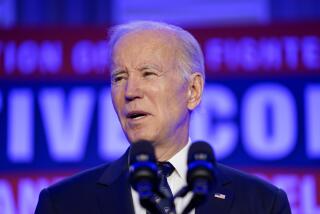Obama favors ‘Cadillac tax’ for healthcare
- Share via
Reporting from Washington — President Obama told top Democratic House members on Wednesday that he favored a tax on insurance companies offering more expensive healthcare plans as a means of extending insurance to millions of people who are not covered, according to a person familiar with the meeting.
The “Cadillac tax” is a feature of a healthcare bill that cleared the Senate before the Christmas holiday. But the House has chosen another financing method -- a tax hike on the wealthy.
Powerful labor unions at the core of the Democratic base are opposed to the Cadillac tax, saying that in some cases union members gave up wage increases in return for richer healthcare benefits.
Obama’s preference may put pressure on the House to adopt the Senate tax as part of a compromise between the two bodies. Obama made his views known at a late-afternoon meeting with House Speaker Nancy Pelosi (D-San Francisco) and other senior Democrats.
Hours earlier, White House Press Secretary Robert Gibbs was asked by reporters whether Obama preferred the Senate tax or the House version. “I have not heard him weigh definitively in one versus the other,” Gibbs said.
Wednesday’s meeting, the second in two days, was part of a White House effort to take a more active role in healthcare negotiations as they reach their final stage.
House and Senate leaders are trying to strike a compromise and send a bill to the president’s desk before his State of the Union speech in the coming weeks.
The more active role is a change for the White House, which for months gave wide latitude to Congress as it shaped a bill.
A Senate aide who requested anonymity because he was not authorized to discuss the closed-door meetings said that the White House had signaled it would “convene and run” meetings from now on as lawmakers strive to reach a consensus, reflecting a “significant uptick” in the Obama administration’s involvement.
The Democratic leadership welcomes a more hands-on White House, as Obama’s imprimatur could provide political cover to members casting a tough vote in an election year.
“The White House recognizes that it’s time to step up,” said Chris Jennings, a senior healthcare advisor in the Clinton administration. “They need to spend capital in order to get this over the finish line. It can be extremely helpful because, fundamentally, you don’t want to delay any longer than you have to. Their involvement can accelerate this from a political and technical perspective.”
As the debate winds down, the House appears resigned to foregoing the so-called public option -- a government-run healthcare plan that would compete with private insurers in hopes of lowering premiums and improving coverage. Though the House bill includes the public option, the Senate bill does not.
On one point both chambers seem to agree: keeping the negotiations private.
As a candidate, Obama promised that healthcare negotiations would be shown on C-SPAN so viewers could get a clear sense of who was protecting the public interest. C-SPAN is willing. Last month, C-SPAN Chief Executive Brian Lamb sent a letter to Congress asking permission to televise important healthcare negotiations.
Rep. George Miller (D-Martinez), who attended the meeting with Obama on Wednesday, said there was no mention of televising future meetings.
A group of House Republicans called the Republican Study Committee put out a statement mocking Pelosi’s assertion this week that the healthcare bill had been devised amid unprecedented openness.
“C-SPAN is practically begging the Democrats to make their deliberations public (like President Obama repeatedly promised on the campaign trail), but so far all they’ve offered in response are Orwellian claims about the most open process ever,” the statement read. “Frankly, Madam Speaker, you should stop insulting Americans’ intelligence.”
An Obama ally condemned the healthcare plan Wednesday. California Gov. Arnold Schwarzenegger, a Republican, used his State of the State speech to deride the bill as “healthcare to nowhere.”
Schwarzenegger said: “Now as you know, while I enthusiastically supported healthcare reform, it is not reform to push more costs onto states that are already struggling while other states are getting sweetheart deals. Healthcare reform, which started as noble and needed legislation, has become a trough of bribes, deals and loopholes.”
Sen. Dianne Feinstein (D-Calif.) quickly scolded Schwarzenegger for his comments, saying California’s budget troubles were not Obama’s fault.
“It sounds like the governor is looking for someone else to blame for California’s budget,” Feinstein said.
“I am open to working with state leaders to find ways to help California in these tough times, but pointing fingers is not constructive.”
More to Read
Get the L.A. Times Politics newsletter
Deeply reported insights into legislation, politics and policy from Sacramento, Washington and beyond. In your inbox twice per week.
You may occasionally receive promotional content from the Los Angeles Times.










